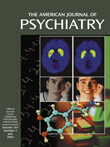To the Editor: We believe that the interesting report by Lori Altshuler, M.D.
(1), and colleagues on an increased relapse rate into depression in patients after antidepressant discontinuation compared to patients who continued treatment may be difficult to interpret because of some methodological issues. Our clinical experience is consistent with the finding that only 15.3% (84 of 549) of the original sample tolerated antidepressants for 60 days and responded to them (presumably with exclusion of patients who did not respond acutely or developed acute mania or hypomania). This suggests that most patients with bipolar disorder do not benefit from antidepressant treatment.
However, the observational nonrandomized design that was used makes the study susceptible to so-called “confounding by indication.” Assignment to the two treatment groups was likely dependent on characteristics associated with the outcome rather than simply the implied obverse, or in other words, it is not straightforward to understand how many of the patients did poorly because they were discontinued from antidepressants versus how many were discontinued from antidepressants because they were doing poorly. As a consequence, the results might not hold up after adjustment for confounding factors, usually handled in a stratified or multivariate analysis. For instance, a rapid-cycling course, which is a risk factor for poor outcome and a common reason why antidepressants are discontinued, was apparently not measured or controlled for. The findings of the study would have been more informative had they resulted from adjusted analysis in the Cox proportional hazards model used, after control for all relevant clinical variables, such as the prevalence of rapid-cyclers, bipolar I and II subtypes, comorbidities (especially substance abuse), enrollment centers with possibly different treatment strategies, and other treatments given, especially mood stabilizers. Additional relevant baseline variables, not reported or considered (purportedly because of lack of statistical significance), could have been incorporated in a multivariable analysis because univariate p value comparisons are not informative in assessing potential confounders
(2).
It would also be important to know how many patients who entered the study could complete the follow-up period because the dropout rate, which was not reported, can be associated with treatment outcome and side effects.
The investigators acknowledged that a previous double-blind randomized controlled trial
(3) contradicted their findings but focused on a post hoc subgroup reanalysis that was consistent with their results. The more valid a priori analysis of the randomized controlled trial failed to find any notable difference between continuing and discontinuing antidepressants.
Furthermore, there was no adequate acknowledgment that a review of randomized controlled trials of multiple maintenance treatments reported an inefficacy of tricyclic antidepressants in the prevention of bipolar depression
(4).
Given these limitations, we submit that recommendations for long-term treatment with antidepressants in bipolar disorder may be premature and counterproductive for the public health.

